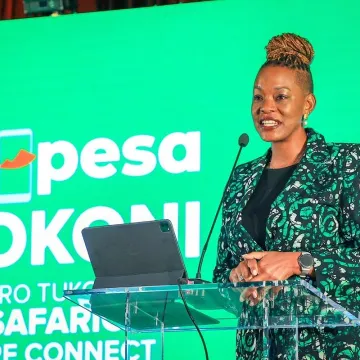Bridging the literacy gap: Why digital skills are the key to empowerment

Head of Programmes, Stanbic Foundation, Dorine Nalo.
The adult literacy rate for people aged 15 and above globally improved to 87.4% in 2024, showing notable progress from earlier decades when only a small fraction of the world was literate.
Despite this progress, significant inequalities remain, notably between some sub-Saharan African countries and the rest of the world. In some countries in sub-Saharan Africa, fewer than 1-in-3 adults (aged over 15 years) can both read and write, according to researchers at the University of Oxford.
This is why, as we mark International Literacy Day, we must ask ourselves what we need to do to catch up with the rest of the world. As things also change, we also need to expand our definition of literacy beyond just reading and writing.
Today, true empowerment hinges on digital fluency, the ability to navigate, understand, and leverage the interconnected world of technology. Without this, we risk being left behind.
Education is indeed the cornerstone of societal progress, yet in Kenya and across Africa, significant literacy disparities persist. Millions of young people lack the resources, skills, and opportunities necessary to succeed in an increasingly digital and interconnected world.
If this digital literacy gap is not addressed, it poses a threat not only to individual potential but also to national economic growth and global competitiveness.
Evolving education landscape
Kenya's literacy rate, while commendable in its upward trajectory, masks a deeper issue: inequality in access to quality education, particularly digital education. Marginalised communities, especially in rural and informal urban settlements, continue to struggle with inadequate infrastructure, under-resourced schools, and critically, limited access to technology.
According to recent statistics from UNESCO and the Kenya National Bureau of Statistics (KNBS), while urban literacy stands above 80%, rural areas lag, with rates averaging 60% in some counties.
This disparity reveals an urgent need to focus on equity alongside progress, especially as the rapid pace of technological advancements intensifies. For many young Kenyans, access to digital tools remains a distant dream.
At the Stanbic Foundation, we believe in the transformative power of technology to tackle these disparities head-on. Our Future Ni Digital platform is a testament to this commitment. By equipping Vocational Training Centres (VTCs) with critical digital infrastructure and digital learning resources, we are actively empowering youth with the essential digital skills needed to excel in a competitive job market.
These initiatives go beyond just access; they redefine learning experiences. Digital platforms facilitate interactive, self-paced learning, allowing students to tailor their education to their needs.
Role of Partnerships
No single organisation can bridge the digital literacy gap alone. Success lies in partnerships that leverage collective strengths. Through collaborations with county governments, private-sector players, and non-profit organisations, the Stanbic Foundation has significantly amplified its impact.
For instance, our partnership with American Tower Corporation (ATC) has enabled us equip tertiary learning institutions with digital infrastructure; computers and connectivity while our partnership with Microsoft and has enabled integration relevant and up to date digital content into classrooms, ensuring our programs are current and relevant.
By involving parents, teachers, and local leaders in the educational process, we create a holistic support system that ensures sustainability and ownership.
Transforming Lives
The transformation we witness is tangible and inspiring. Recently, in the Coast Region, we celebrated the graduation of youth from the Future Ni Digital program across four counties. These graduates are not just literate in the traditional sense; they are digitally empowered, highly employable, and increasingly entrepreneurial.
They represent the powerful ripple effect of what's possible when relevant education meets innovation and foresight.On this International Literacy Day, let us reaffirm that education, in its broadest sense, is a universal right, not a privilege. Bridging the digital literacy gap is not just a moral imperative; it is an economic necessity for Kenya's future.
As we continue to innovate and collaborate, I urge all stakeholders – government, private sector, civil society, and individuals – to join hands in this vital mission. Invest in technology. Support grassroots digital initiatives. Advocate for policies that prioritise inclusive, digitally focused education.
The future of Kenya depends on the opportunities we create today. The digital literacy gap may be vast, but with vision, determination, and collective effort, we can bridge it. Together, we can ensure that no child is left behind in the journey toward educational and digital transformation to enable them actively to participate in the increasingly digital world!
By Dorine Nalo, Head of Programmes, Stanbic Foundation




